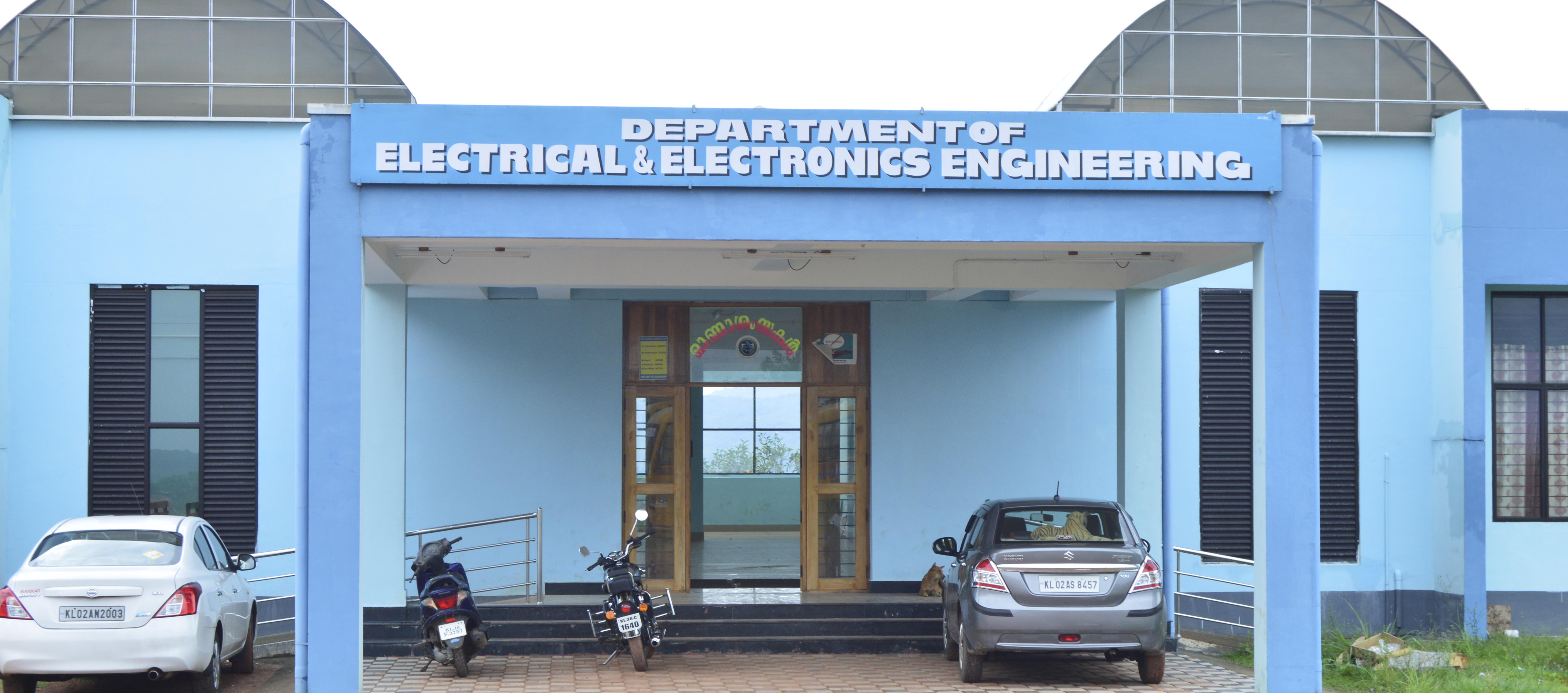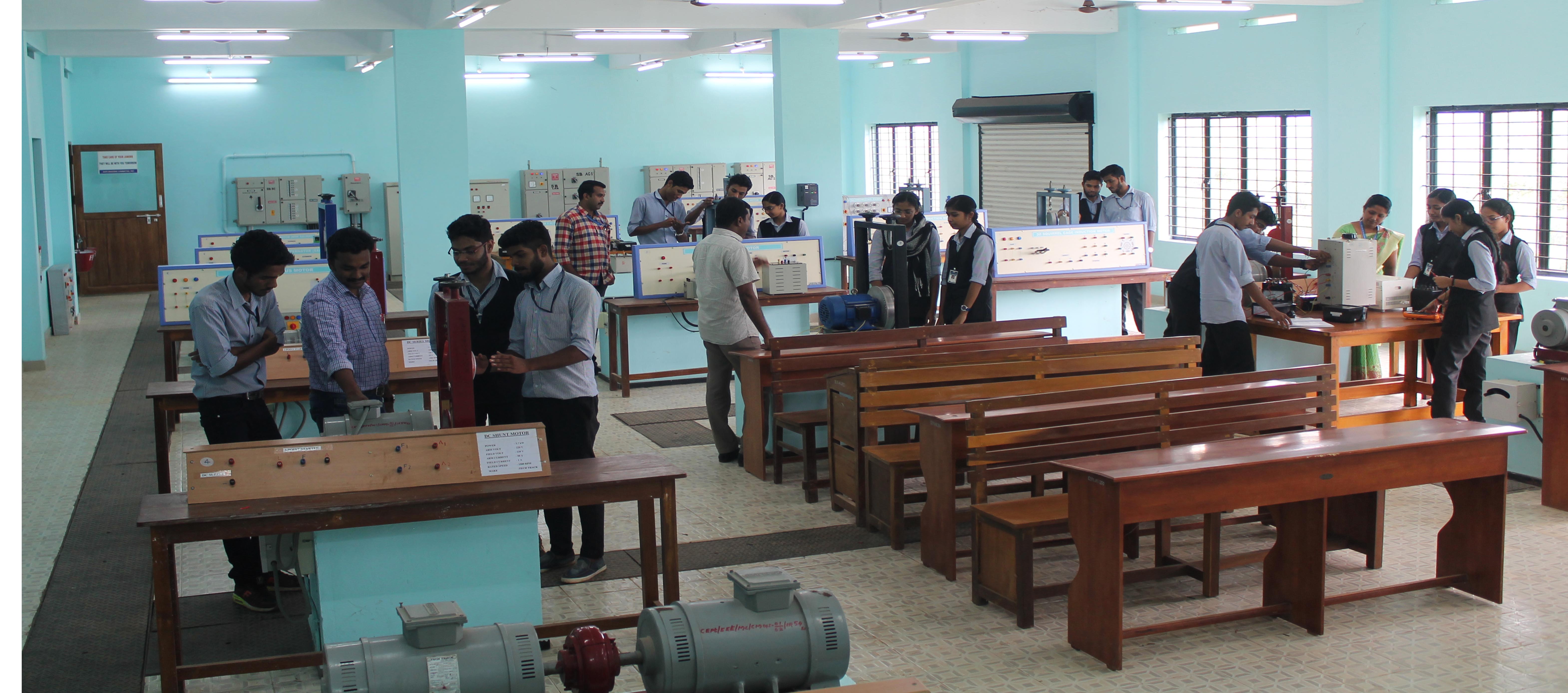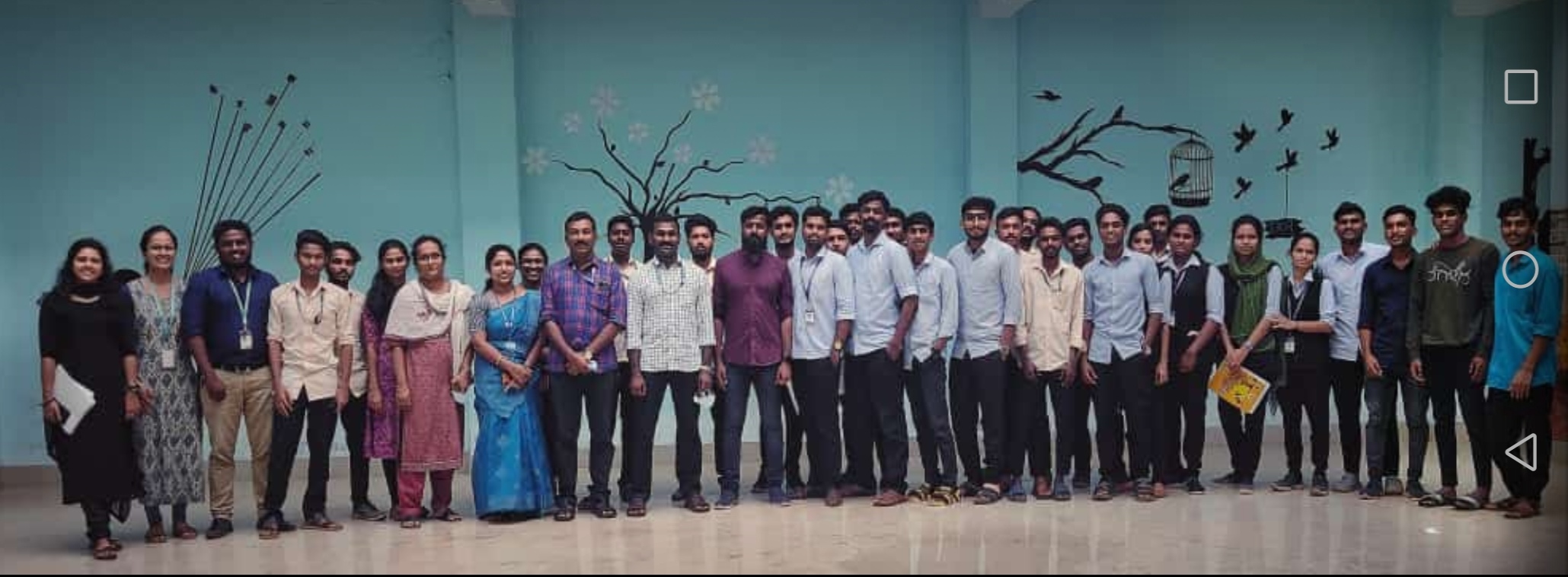Electrical engineering is a field of engineering that generally deals with the study and application of electricity, electronics, and electromagnetism. This stream has a wide range of subfields that includes electronics, digital computers, power engineering, telecommunications, control systems, radio-frequency engineering, signal processing, instrumentation, and microelectronics. Many of these sub disciplines overlap and also overlap with other engineering branches, spanning a huge number of specializations such as hardware engineering, power electronics, electromagnetic & waves, microwave engineering, nanotechnology, electrochemistry, renewable energies, mechatronics, electrical materials science, and many more. Electrical engineers typically hold a degree in electrical engineering or electronic engineering. Practicing engineers may have professional certification and be members of a professional body. Such bodies include the Institute of Electrical and Electronics Engineers (IEEE) and the Institution of Engineering, ISTE and Technology (professional society) (IET) (formerly the IEE).
Electrical engineers work in a very wide range of industries and the skills required are likewise variable. These range from basic circuit theory to the management skills required of a project manager. The tools and equipment that an individual engineer may need are similarly variable, ranging from a simple voltmeter to a top end analyzer to sophisticated design and manufacturing software.
The department boasts 12 well qualified faculty. All the faculty continuously undergo various skill development programs to enhance their skills so that the students can be benefitted. Department faculties have produced 5 impact factored journals and also a patent submission has been made. Faculty has submitted for research funding in CERD and also KSCTE funding. Moreover students regularly apply for CERD and KSCTE funds and more than 10 number students have been benefitted. During 2015-16, a bio-medical project named “smart blind assist system” was widely appreciated by a competition held by YUVA mastermind. The department contains a student’s association named AEES. Every semester, they used to organize skill development programs.
This Department currently runs a Bachelors programme (final Year) and a Diploma Program on Electrical and Electronics Engineering with an intake of 60 students per academic year to cater to the ever challenging needs of technical excellence in specialised avenues of Electrical Engineering.
The programme provides the students with a strong background in the broad areas of Electrical Engineering, namely, communication technology, control technology, electronics, and power & energy. A strong exposure to state-of-the-art technologies is further provided through elective courses that are carefully designed for the interested students.
This department consist of well established labs and well qualified faculty. The ambience of the department contains friendliness in air and quality in class. Ultimately this department is dedicated to serve the future young aspirants
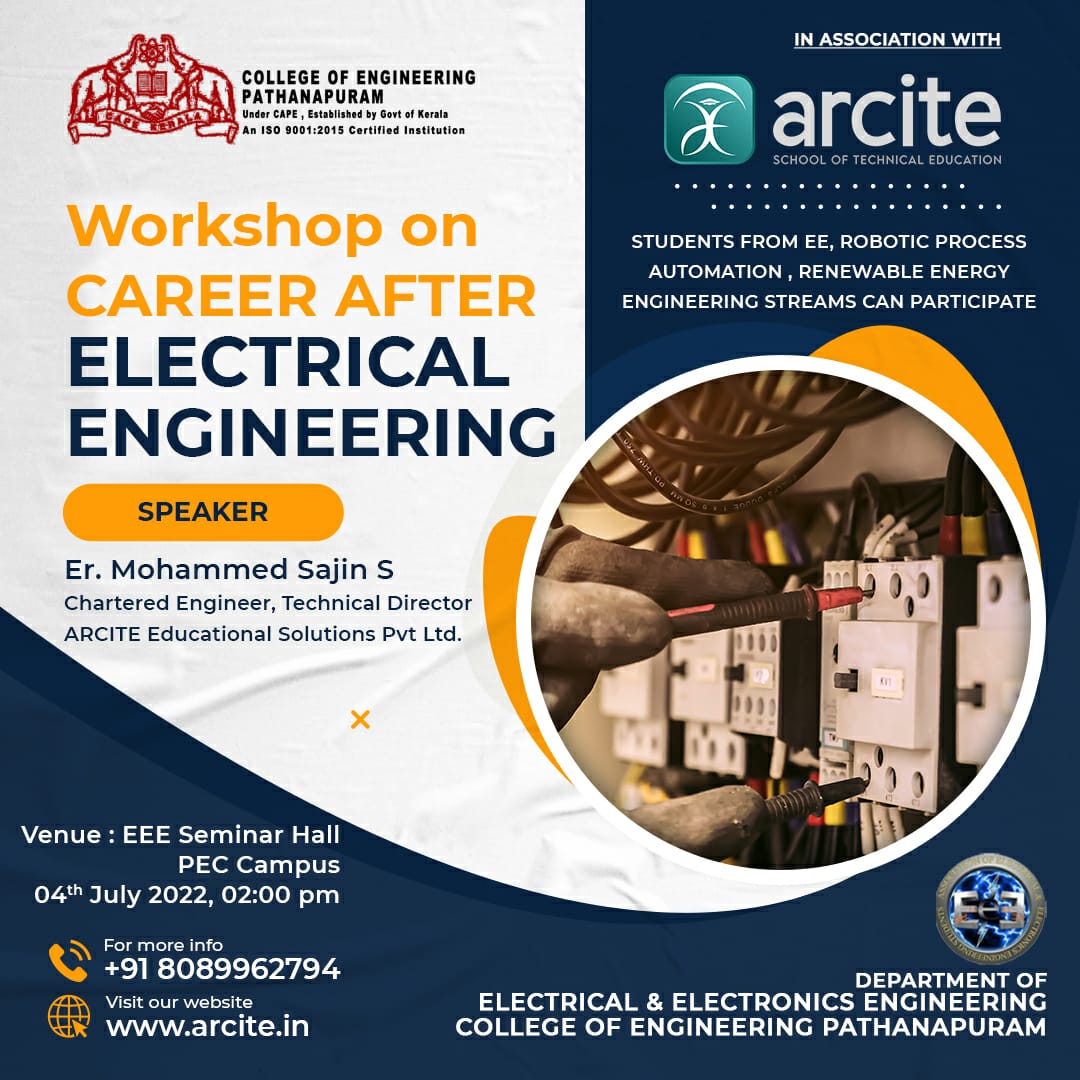
Workshop on Career after Electrical engineering on July 4th 2022
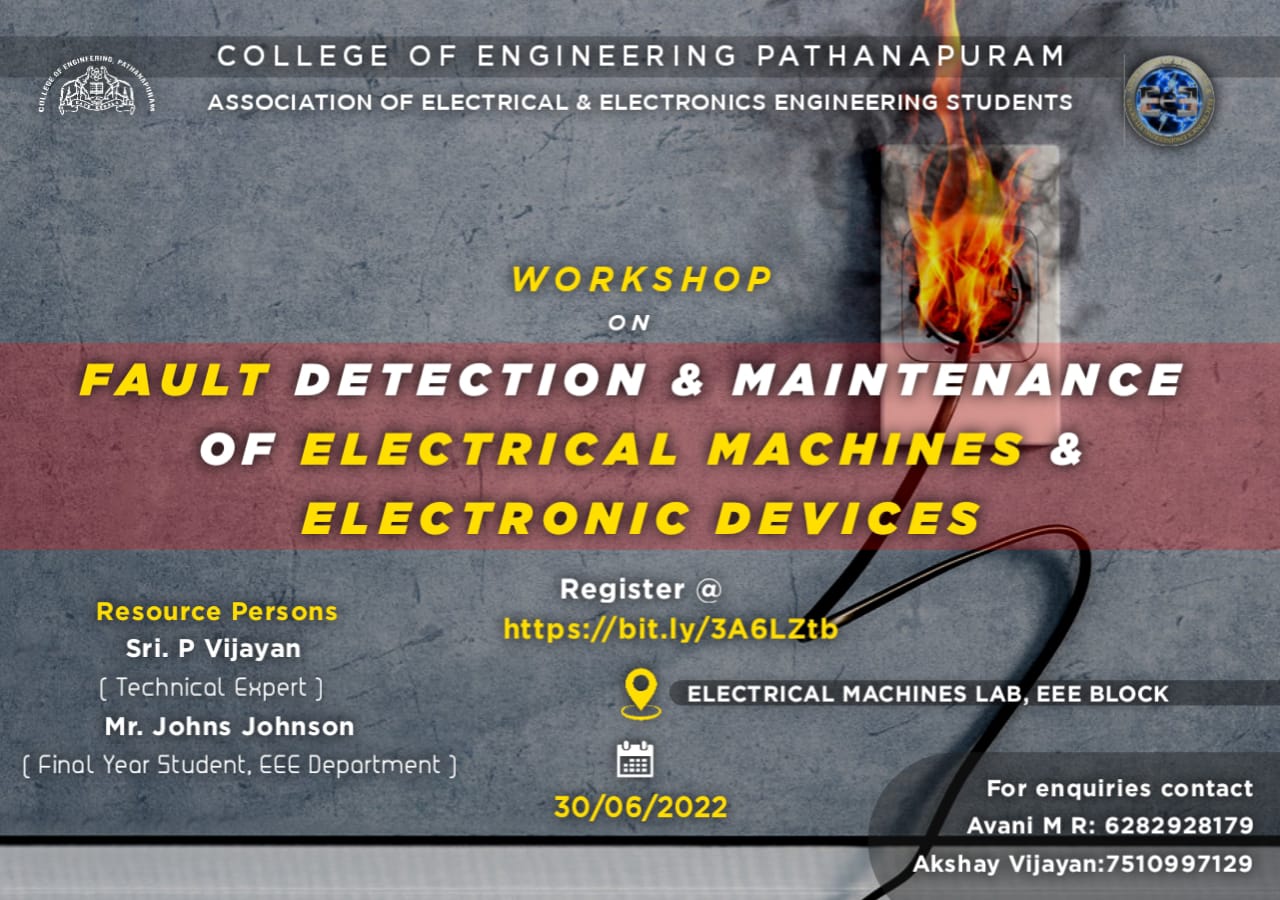
Workshop on an Fault detection and maintenance on June 30th 2022
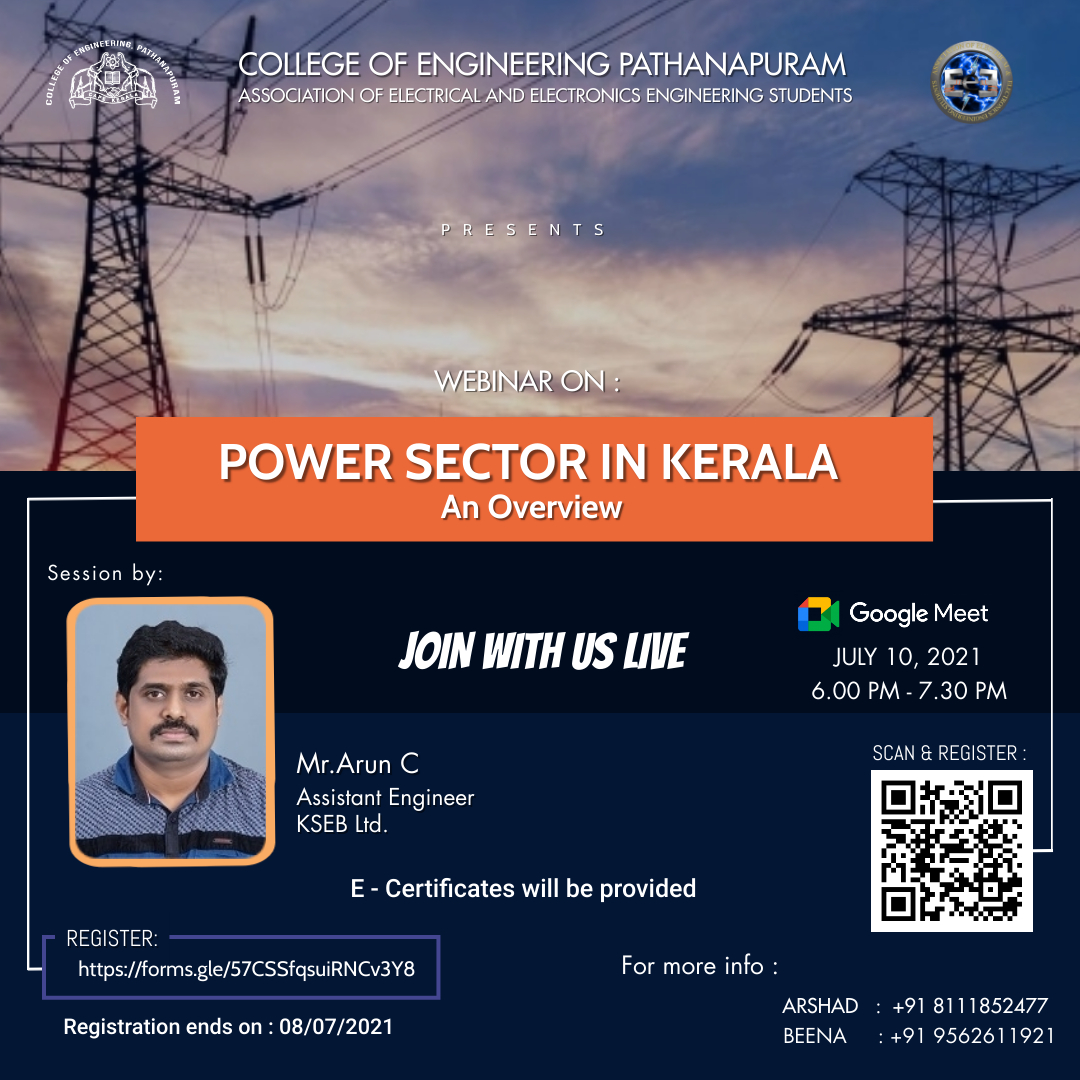
Webinar on an Overview of POWER SECTOR IN KERALA on July 10th 2021
The Association of Electrical & Electronics Engineering Students (AEEES) is the technical association of the Electrical and Electronics Department of PEC. It is a link between the faculty and the students of department of electrical engineering. It aims at encouraging the students to improve their technical skills and to providing ample opportunities for realizing their ideas. A verity of technical activities are organized by the association which are co-ordinated by the students with the guidance of staff members. This helps them to improve their leadership and management skills.
The Association was formally inaugurated on 7th March 2014 .In connection with that ‘Technical Expo’ was arranged. Students exhibited various working and still models to demonstrate the recent developments of Electrical Engineering. Different technical programs, workshops, seminars, paper presentation and project presentation were also conducted as a part of this.
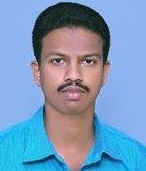
Shibin D H
ASST PROFESSOR(HoD)

Akhila Anand
ASST PROFESSOR(Leave-PhD)
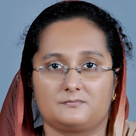
Fathima Salim
ASST PROFESSOR
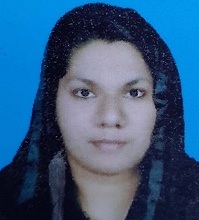
Thasni S Habeeb
ASST PROFESSOR
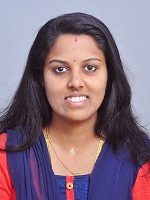
Nangha Rajan
ASST PROFESSOR
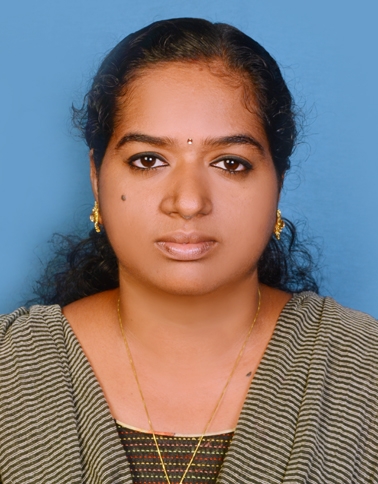
Kalaji L K
ASST PROFESSOR

Leena K Y
ASST PROFESSOR
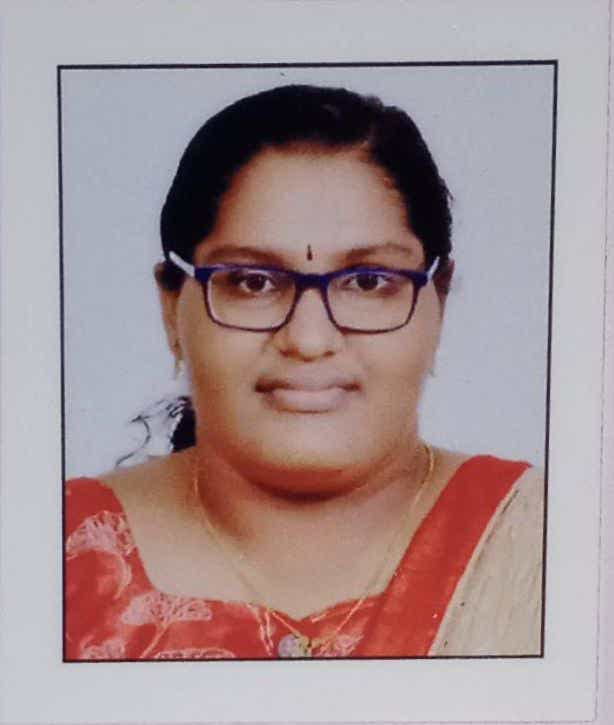
Darsana U D
ASST PROFESSOR
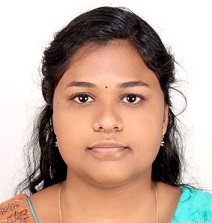
Jijitha John
ASST PROFESSOR
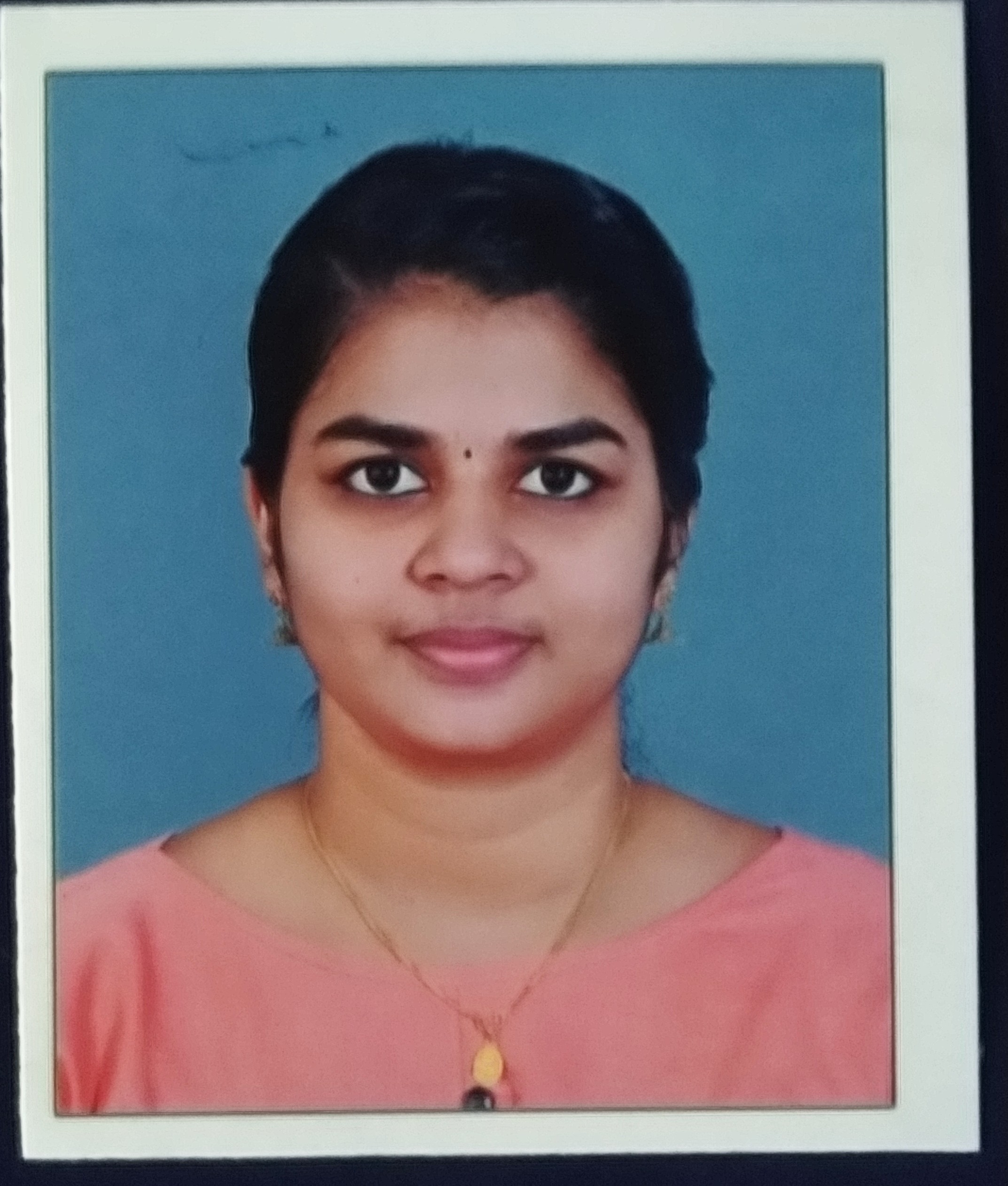
Akhila G Babu
ASST PROFESSOR
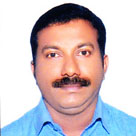
Sreeji T G
INSTRUCTOR
Various technical facilities in the workshop including machine shop, fitting shop, smith shop, carpentry shop, welding shop and foundry shop, concepts in electrical safety, safety regulations, earthing concepts, electrical shocks and treatment. Use of tools used by electricians, wiring regulations, types of cables and electric accessories including switches, plug, circuit breakers, fuses etc., symbols for electrical wiring schematics e.g. switches, lamps, sockets etc., drawing and practice in simple house wiring and testing methods, wiring schemed of two way and three way circuits and ringing circuits, voltage and current measurement, transformer windings (low voltage: 6,9 and 12 volts), motor and generator windings (concept only).
List of Experiments
One lamp controlled by one switch.
Series and parallel connections of lamps.
Stair case wiring.
Hospital Wiring.
Godown wiring.
Fluroscent lamp.
Connection of plug socket.
Different kinds of joints.
Transformer winding.
Soldering practice.
Familiarisation of CRO.
Electrical and measurements lab prepares the students technically to handle bridge circuits and measuring meters. This lab is highly important for the students to understand the practical aesthetics of the measuring devices.
List of Experiments
Measurement of resistance using Wheatstone’s bridge.
Measurement of resistance using Kelvin’s double bridge.
Measurement of self and mutual inductance of coupled coils.
Measurement of KVAR in 3-phase circuits by single and two wattmeter method.
Calibration of ammeter using slide wire potentiometer.
Calibration of Voltmeter using slide wire potentiometer.
Measurement of internal resistance of battery using vernier potentiometer.
Measurement of resistance of earth electrode using earth megger.
Calibration of wattmeter using vernier potentiometer.
Determination of B-H curve.
Determination of Hysterisis loop-tracing the loop using CRO.
Calibration of single phase energy meter by direct and phantom loading.
Calibration of single-phase energy meter at 0.5 & 0.866 p.f. without using phase
Shifting transformer.
Calibration of 3-phase energy meter.
Adjustments in energy meter using rotating sub- standard.
Electronics circuits’ lab contains experiment that has a design part, simulation and an actual experimental verification in the laboratory (bread-boarding/soldering). The basic objective is to give hands-on experience in the design and implementation of analog and mixed-signal circuits.
List of Experiments
Study of Multimeter,Signal generators,CRO etc. and measurement of electrical quantities.
Testing of Passive and Active components.
Characteristics of Active devices.
Rectifying circuits.
Differentiating circuit and integrating circuit.
Clipping & Clamping circuits..
Amplifying circuits Simple common emitter amplifier configuration-gain and bandwidth.
Oscillators.
Multivibrators – Astable only.
Circuits using OP- Amps.
This lab enables the students to design, setup and analyze various digital circuits and design an embedded system for a particular application.
This lab enables the students to design setup and analyze various power electronic converters and apply these converters for the implementation of various motor control applications.
This lab deals with advanced electrical engineering concepts like design and testing of electrical set-ups using matlab and simulinks. Here the lab mainly concentrates on equipping the software and hardware and analysis skills of the students that is related to electrical designing.
List of Experiments
MATLABI–experiments using MTLAB toolbox.
Determination of transfer functions of DC motor (a) armature control (b) field control.
Study and experiments on(a)DC servo motor(b)AC servomotor.
Experiments on synchros (a) characteristics (b) data transmission (c) error detection (d) differentialsynchro.
Determination of transfer functions of the amplidyne and load characteristics.
Design and experimental determination of frequency response determination of lag,lead and lag-lead networks.
Magnetic amplifier – characteristics and control circuits.
Static and dynamic performance evaluation of transducer (a) resistance thermometer (b) vibration pick up (c) pH meter.
Study and performance evaluation of transducers (a) strain gauge (b) inductive pick up (c) capacitive pick up (d)LVDT.
Study and experiments on pneumatic control system.
Microprocessor based generation of non-linear functions using proper interfacing and display devices.
PSPICE simulation of single-phase and three-phase diode bridge rectifiers.
PSPICE simulation of three-phase thyristor bridge rectifier.
Power flow analysis of the system with the given single line diagram, using the given power flow analysis package.
Fault analysis of the system with given single line diagram, using the given fault analysis package.Obtain the sub-transient fault currents for DLFG, DLFG, LLF faults at leach bus..
Determination of relay characteristics.
This lab provides students to learn the working and testing methods of DC machines and transformers so that they will be able to test and validate DC generators, DC motors and transformers. This lab enables the students to think innovatively on the development of components, products, processes or technologies in the engineering field, analyses the problem requirements and arrive workable design solutions
List of Experiments
Open Circuit Characteristics of a DC Shunt Generator.
Load Test on a DC Shunt Generator.
Brake Test on a DC Shunt.
Brake Test on a DC Series.
Load Characteristics of a DC Compound Generator Objectives.
Swinburne’s Test on a DC Shunt Machine.
Hopkinson’s test on a pair of DC machines.
Retardation test on a DC machine.
Separation of losses in a DC shunt motor.
OC & SC Tests on a Single Phase Transformer.
DirectLoad Test on a Single Phase.
Separation of Constant losses of a Single Phase.
Sumpner’s Test.
Parallel Operation of two dissimilar Single Phase Transformers.
OC & SC Tests on a Three Phase Transformer.
This lab provides students hands on experience in testing Alternators, Three phase and Single phase Induction Motors and Induction Generators so that students will be able to test and validate Alternators, Three phase and Single phase Induction Motors and Induction Generators.
List of Experiments
. Regulation of alternator by direct loading.
. Regulation of three phase alternator by emf and mmf methods.
Regulation of alternator by Potier and ASA methods.
Regulation of alternator by Potier method using inductive load.
Regulation of salient pole alternator using two reaction theory.
Active and reactive power control in grid connected alternators.
Study of induction motor starters.
Variation of starting torque with rotor resistance in slip-ring induction motors.
Speed control of slip ring induction motor by varying rotor resistance.
Load test on three phase squirrel cage induction motor
Load test on three slip ring induction motor
No load and block rotor test on three phase induction motor.
Performance characteristics of pole changing induction motor
V curve of a synchronous motor.
Performance characteristics of induction generator.
Equivalent circuit of single phase induction motor
Electrical braking of slip ring induction motor
Separation of hysteresis loss in a three phase slip ring induction motor
This lab enables the students to think innovatively on the development of components, products, processes or technologies in the engineering field, analyses the problem requirements and arrive workable design solutions

Workshop on Career after Electrical engineering on July 4th 2022

Workshop on an Fault detection and maintenance on June 30th 2022

Webinar on an Overview of POWER SECTOR IN KERALA on July 10th 2021
The Association of Electrical & Electronics Engineering Students (AEEES) is the technical association of the Electrical and Electronics Department of PEC. It is a link between the faculty and the students of department of electrical engineering. It aims at encouraging the students to improve their technical skills and to providing ample opportunities for realizing their ideas. A verity of technical activities are organized by the association which are co-ordinated by the students with the guidance of staff members. This helps them to improve their leadership and management skills.
The Association was formally inaugurated on 7th March 2014 .In connection with that ‘Technical Expo’ was arranged. Students exhibited various working and still models to demonstrate the recent developments of Electrical Engineering. Different technical programs, workshops, seminars, paper presentation and project presentation were also conducted as a part of this.

Shibin D H
ASST PROFESSOR(HoD)

Akhila Anand
ASST PROFESSOR(Leave-PhD)

Fathima Salim
ASST PROFESSOR

Thasni S Habeeb
ASST PROFESSOR

Nangha Rajan
ASST PROFESSOR

Kalaji L K
ASST PROFESSOR

Leena K Y
ASST PROFESSOR

Darsana U D
ASST PROFESSOR

Jijitha John
ASST PROFESSOR

Akhila G Babu
ASST PROFESSOR

Sreeji T G
INSTRUCTOR
Various technical facilities in the workshop including machine shop, fitting shop, smith shop, carpentry shop, welding shop and foundry shop, concepts in electrical safety, safety regulations, earthing concepts, electrical shocks and treatment. Use of tools used by electricians, wiring regulations, types of cables and electric accessories including switches, plug, circuit breakers, fuses etc., symbols for electrical wiring schematics e.g. switches, lamps, sockets etc., drawing and practice in simple house wiring and testing methods, wiring schemed of two way and three way circuits and ringing circuits, voltage and current measurement, transformer windings (low voltage: 6,9 and 12 volts), motor and generator windings (concept only).
List of Experiments
Electrical and measurements lab prepares the students technically to handle bridge circuits and measuring meters. This lab is highly important for the students to understand the practical aesthetics of the measuring devices.
List of Experiments
Electronics circuits’ lab contains experiment that has a design part, simulation and an actual experimental verification in the laboratory (bread-boarding/soldering). The basic objective is to give hands-on experience in the design and implementation of analog and mixed-signal circuits.
List of Experiments
This lab enables the students to design, setup and analyze various digital circuits and design an embedded system for a particular application.
This lab enables the students to design setup and analyze various power electronic converters and apply these converters for the implementation of various motor control applications.
This lab deals with advanced electrical engineering concepts like design and testing of electrical set-ups using matlab and simulinks. Here the lab mainly concentrates on equipping the software and hardware and analysis skills of the students that is related to electrical designing.
List of Experiments
This lab provides students to learn the working and testing methods of DC machines and transformers so that they will be able to test and validate DC generators, DC motors and transformers. This lab enables the students to think innovatively on the development of components, products, processes or technologies in the engineering field, analyses the problem requirements and arrive workable design solutions
List of Experiments
This lab provides students hands on experience in testing Alternators, Three phase and Single phase Induction Motors and Induction Generators so that students will be able to test and validate Alternators, Three phase and Single phase Induction Motors and Induction Generators.
List of Experiments
This lab enables the students to think innovatively on the development of components, products, processes or technologies in the engineering field, analyses the problem requirements and arrive workable design solutions
